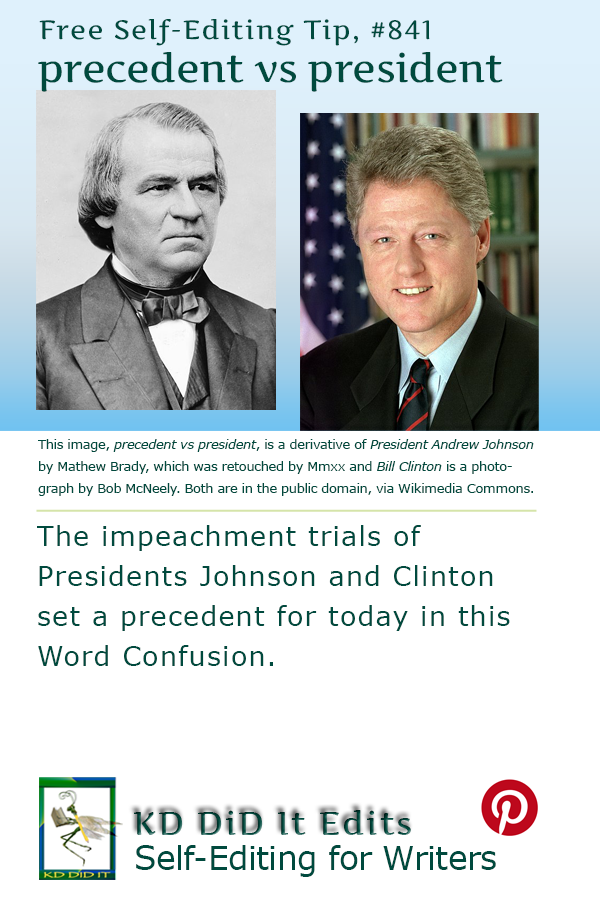Revised as of 18 April 2021
There is precedent in how to impeach a president. Lord knows, we’ve been inundated with the history. With the current impeachment brouhaha going on, it should be easy for self-editing writers to remember the difference between the two:
- Precedent is most commonly used when discussing legal issues and refers to previous rulings that guide today’s decisions.
- President is always the head of something, whether it be a country, a college, a corporation, or any other organization.
You may want to read up on the post “Precede versus Proceed” as well.
Word Confusions…
…started as my way of dealing with a professional frustration with properly spelled words that were out of context in manuscripts I was editing as well as books I was reviewing. It evolved into a sharing of information with y’all. I’m hoping you’ll share with us words that have been a bête noir for you from either end.
If you found this post on “Precedent versus President” interesting, consider tweeting it to your friends. Subscribe to KD Did It, if you’d like to track this post for future updates.
| Precedent | President |
|---|---|
| Credit to: Apple Dictionary.com; Dictionary.com: precedent; Lexico.com: precedent, president | |

Floraisons d’hiver by Isaszas is under the CC BY 2.0 license, via VisualHunt. — Uh-oh, letting the cat stay on the table sets a precedent in her mind… |

This Portrait of George Washington was painted by Gilbert Stuart Williamstown and is in the public domain, via Wikimedia Commons. — George Washington was our first president. |
| Part of Grammar: | |
| Adjective 1; Noun 2
Plural for the noun: precedence, precedents |
Noun
Plural: presidents |
| Adjective: Going or coming before in time, order, or importance
Noun:
|
The elected head of a republican state
[Christian Church] The celebrant at a Eucharist |
| Examples: | |
| Adjective: It is a precedent case. I shall add to the definition of humanly free agents, that they are agents whose choices do not have fully deterministic precedent causes. All that has happened is that there is a set of precedent requirements of a procedural kind before a court case can be commenced. Once a power to detain is held to depend on precedent fact, then of course anyone subjected to it can properly invoke habeas corpus. Noun: This is breaking with all precedent. The decision set a precedent for others to be sent to trial in the US. Do you want to set a precedent? |
The current Irish president is Michael Higgins.
President Kennedy created the Peace Corps. The European Community has a president as its head. The head of a college or university is a president in North America and a chancellor in most Commonwealth countries. Ecuador’s state oil company president resigned Tuesday for failing to halt a steady decline in production. The report sees the president at the Eucharist as representing both the Body and the Head of the Church. |
| Derivatives: | |
| Adjective: nonprecedent, precedental, precedented, precedentless, quasi-precedent Noun: nonprecedent, precedence, precedency, precession Verb: precede |
Adjective: presidential Adverb: presidentially Noun: president-elect Verb: preside, presidentship |
| History of the Word: | |
|
Late Middle English, via the Old French from the Latin praesident- meaning sitting before. |
C’mon, get it out of your system, bitch, whine, moan…which words are your pet peeves?
Satisfy your curiosity about other Word Confusions on its homepage or more generally explore the index of self-editing posts. You may also want to more generally explore the index of self-editing posts. You may also want to explore Formatting Tips, Grammar Explanations, Linguistics, Publishing Tips, the Properly Punctuated, Writing Ideas and Resources, and Working Your Website.
Pinterest Photo Credits:
This photograph of President Andrew Johnson by Mathew Brady was retouched by Mmxx and Bill Clinton is a photograph by Bob McNeely. Both are in the public domain, via Wikimedia Commons.


